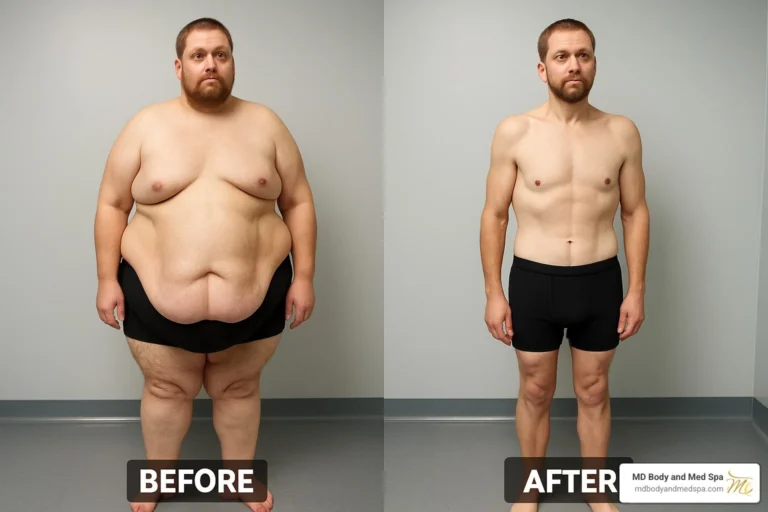Why Weight Loss Isn’t Just About Calories

Weight loss is about more than just eating fewer calories than you burn. Factors like hormonal imbalances, such as low testosterone in men or PCOS in women, as well as metabolic health and medical conditions, can impact weight management. These challenges explain why traditional calorie-counting methods don’t always work. Here’s a look at key factors that influence weight loss and why a one-size-fits-all approach often falls short.
Low Testosterone
Hormones regulate metabolism, hunger, and fat storage. When these hormones are imbalanced, weight loss becomes more challenging, even with a caloric deficit. Low testosterone is a condition that affects both men and women. This hormone influences muscle mass, fat distribution, and metabolic rate. When testosterone levels drop, your body may experience:
- Decreased muscle mass, which reduces overall metabolic rate
- Increased fat storage, particularly around the midsection
- Reduced energy levels that affect physical activity
- Changes in appetite regulation
People with low testosterone often find that standard calorie-reduction methods don’t produce expected results. The decreased muscle mass means their bodies burn fewer calories at rest, making it harder to create the energy deficit needed for weight loss.
PCOS
Polycystic ovary syndrome (PCOS) affects around 15% of women of reproductive age and is linked to hormonal imbalances that impact weight management. Women with PCOS often experience elevated insulin levels that encourage fat storage and increased androgen levels that contribute to weight gain. Additionally, a slower metabolism compared to women without the condition makes managing weight more challenging. These factors create barriers to maintaining a healthy weight.
Traditional weight loss strategies that focus solely on reducing calorie intake may not be effective for women with PCOS. Hormonal and metabolic disruptions require a tailored approach to address the root causes of weight gain. Effective strategies include managing insulin resistance, balancing hormones, and adopting a sustainable, health-focused lifestyle. By targeting these underlying issues, women with PCOS can achieve better weight management outcomes.
Insulin Resistance
Insulin resistance occurs when your body’s cells become less responsive to insulin, the hormone that regulates blood sugar. This condition affects how your body processes and stores energy from food. When you have insulin resistance, your body tends to store more calories as fat, particularly around the abdominal area. Even when you reduce your calorie intake, your body may not respond as expected. People with insulin resistance often find that reducing refined carbohydrates and focusing on blood sugar stability produces better results than simple calorie restriction.
Metabolic Differences
Your metabolism is unique to you and influenced by factors including genetics, age, sex, muscle mass, and medical history. Two people can eat the same number of calories and have completely different outcomes based on their metabolic profiles. Understanding your metabolism can help guide decisions about your health and nutrition.
Some people naturally have faster metabolisms and can maintain their weight with higher calorie intakes. Others may have slower metabolisms that require more careful attention to energy balance. These differences aren’t personal failures; they’re biological realities that affect how your body responds to different approaches.
Look Beyond Calories Alone
Weight loss involves more than just counting calories, but that doesn’t mean calories don’t matter. If you’ve struggled with losing weight despite tracking calories, there may be underlying factors like hormonal imbalances or insulin resistance affecting your progress. A healthcare provider can help identify these issues and offer guidance tailored to your needs. Sustainable weight management works best when it addresses root causes and aligns with your health profile..
- What to Expect When Visiting a Foot and Ankle Specialist
- Causes of PTSD
- The Link Between Plantar Fasciitis and Weight Gain: What You Need to Know
- How Pet Ownership Can Positively Impact Life with Fibromyalgia
- The Importance of Stretching and Flexibility in Sports Medicine
Dr. Emma Green is a health and wellness expert with over 10 years of experience in nutrition and fitness. Passionate about helping others live their healthiest lives, Dr. Green shares practical advice on wellness, nutrition, and sustainable living through LivingSpristine.






